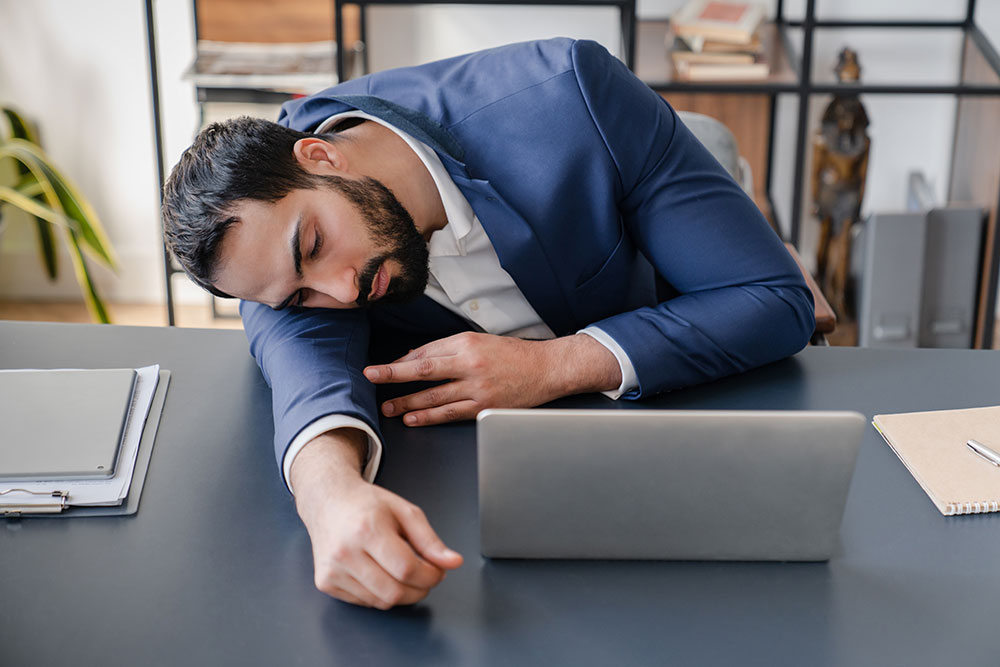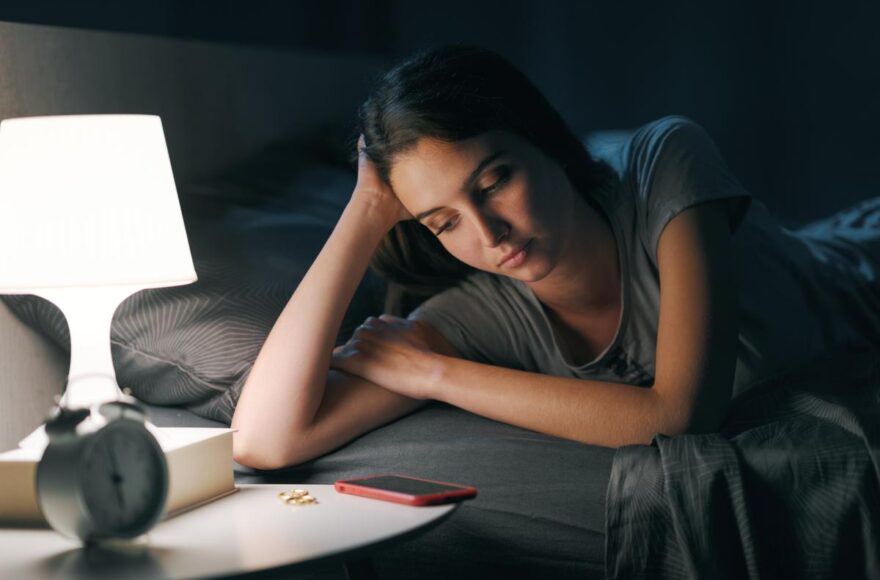What is Chronic Insomnia How to Diagnosis and Treatment

Table of Contents
What is Chronic Insomnia?
Chronic insomnia refers to prolonged difficulty in sleeping. You may have chronic insomnia if you have difficulty falling or staying asleep at least three times a week for three months or more. People with chronic insomnia have a history of the condition, with episodes that may come and go or persist for three months or longer.
Like acute insomnia, chronic insomnia can have various causes and affect individuals of all ages. However, it is more common in women than in men. Chronic insomnia may be related to factors such as
- Stress
- Irregular sleep schedules
- Poor sleep hygiene
- Persistent nightmares
- Mental health disorders
- Underlying physical or neurological problems
- Medications
- Your bed partner
- Sleep disorders
Types of Chronic Insomnia
Chronic insomnia has two main types primary and secondary.
Primary chronic insomnia
Unlike acute insomnia caused by medical condition or medication, and scientists still need to understand it completely. But specialized MRI scans are being used to understand primary chronic insomnia. It helps to some extent, and results show that this condition is related to changes in specific brain chemical levels. But more research needs to know the exact cause of primary chronic insomnia.
Secondary chronic insomnia
Secondary chronic insomnia is related to underlying medical conditions and other situations, such as
- Emotional stress
- Trauma
- Underlying health problems
- Some lifestyle patterns
- Taking certain medications and drugs.
Symptoms of Chronic Insomnia
A person with chronic insomnia may have symptoms at night and during the day. These symptoms can badly affect their everyday life, and they are unable to perform daily tasks. The symptoms are
- Difficulty falling asleep.
- Waking up throughout the night.
- Difficulty staying asleep or difficulty getting back to sleep.
- Waking up too early in the morning.
- Daytime sleepiness or grogginess.
- Fatigue after a whole night’s sleep.
- Irritability or anxiety.
- Mood changes, such as feeling depressed or angry.
- Difficulty concentrating or less focused.
- Problems with memory
- Increase in mistakes, errors, and accidents.
Causes of Chronic Insomnia
Several things can contribute to chronic insomnia. These include an underlying medical condition, certain medications and stimulants, and lifestyle patterns.
Medical conditions
Several medical conditions which persist for a long time can cause chronic insomnia. These include
- Respiratory conditions include asthma, sleep apnea, and chronic obstructive pulmonary disease (COPD).
- Acid reflux
- Diabetes
- Pain
- Congestive heart failure
- Hyperthyroidism
- Fibromyalgia
- Menopause
- Urinary incontinence
- Restless leg syndrome
- Depression
- Physical or emotional stress
- Anxiety
- Bipolar disorder
- Parkinson’s disease
- Alzheimer’s disease
Medications and stimulants
Some medications and stimulants may cause chronic insomnia in some people. Mostly long-term use of these medications and stimulants can trigger chronic insomnia symptoms. These include
- Caffeine
- Alcohol
- Nicotine
- Cold and allergy medications containing pseudoephedrine.
- Beta-blockers
- Diuretics
- Antidepressants
- Stimulant laxatives
- Chemotherapy drugs
- Illicit drugs, like cocaine and other stimulants.
Lifestyle Patterns
People with specific lifestyle patterns may have chronic insomnia. These include
- Night-time working shifts.
- Frequent traveling across multiple time zones can cause jet lag.
- Regular rotating work shifts.
- Frequent daytime napping.
- Poor sleep hygiene
- Lack of physical activity.
- Irregular waking and sleeping routine
Diagnosis of Chronic Insomnia
The diagnosis of chronic insomnia is solely based on your symptoms. Your doctormay ask about your sleep habits, medical history, and any medication you are taking. Your doctor can do the following things to diagnose the cause of your chronic insomnia
Physical exam
The doctor will perform a physical exam to rule out any medical condition that can cause your chronic insomnia. Your doctor will listen to your heart and lungs and check your neck. Because a large neck can cause sleep apnea. Also, your doctor will try to diagnose other health problems that can cause or has symptoms like insomnia. These include
- Heart disease
- Chronic pain
- Overactive thyroid gland
- Sleep apnea
- Acid reflux
- Restless legs syndrome
The doctor will also talk about your sleep habits and can ask the following questions.
- Do you take any medications? What are those?
- Do you use caffeine or alcohol? How much in a day?
- Do you use your phone or other devices in bed before going to sleep?
- When will you wake up and sleep at night?
- Do you have any troubling thoughts or nightmares at night?
- Do you wake up too early in the morning?
- How do you feel tired after a night’s sleep?
This questionnaire can help your doctor make the diagnosis. Also, your doctors can ask other questions to know how much insomnia affects your routine life.
Keep a sleep journal
Your doctor can ask you to keep a sleep journal. You have to write down your sleep patterns for one week or two. It includes
- Bedtime
- Wake time
- Naps
- Caffeine use
- Other distractions at sleep time.
It helps your doctor identify patterns or behaviors that interfere with good sleep. After gathering all this information, the doctor can diagnose your sleep problem. You have chronic insomnia if some or all of these things apply to you
- It takes you more than 30 minutes to fall asleep.
- You wake up during the night and have trouble falling back to sleep.
- You wake up early in the morning and cannot fall back asleep.
- You sleep only 7 hours each night, and your bedroom is quiet, dark, and comfortable.
- You feel fatigued, moody, or worn out during the day.
- You have problems at work, school, or other routine work.
Blood test
The doctor may recommend a blood test to rule out medical conditions that cause chronic insomnia. For example, low iron levels or thyroid issues can negatively affect your good night’s sleep.
Sleep study
A sleep study is the most effective way to diagnose chronic insomnia. It is a polysomnogram test. This test can help your doctor to identify a sleep disorder such as sleep apnea, restless legs syndrome, or narcolepsy that causes chronic insomnia. This test includes an overnight stay at a sleep center, or you perform it yourself at home.
The doctor provides you a kit to perform this test at home. You have to wear sensors on your face, arms, chest, legs, and fingers while you sleeping. These sensors can measure and monitor your
- Heart rate
- Breathing and oxygen levels
- Brain waves
- Muscle movements
Actigraphy
It is another sleep test to measure how well you sleep. You can do this test at home by wearing a sensor on your ankle or wrist for a few days or weeks. This can monitor you while you are awake and asleep. It is helpful in the diagnosis of insomnia, sleep apnea, and other sleep disorders.
Treatment of Chronic Insomnia
Treatment of chronic insomnia involves practicing good sleep hygiene, psychotherapy, and medications. Sometimes treating the underlying medical condition can also help to treat chronic insomnia.
Cognitive behavioral therapy (CBT)
CBT is considered a first-line treatment for insomnia. In this therapy, you can learn how to improve your sleep habits and change the beliefs and behaviors that interfere with your good night’s sleep. CBT is more effective than sleep medications in treating chronic insomnia. CBT includes the following techniques
1. Cognitive techniques
In this, you have to write your worries or concerns before going to bed in a sleep journal or diary. This can help reduce those things that can keep you awake and restless at night.
2. Stimulus control
It involves setting the same wake-up and sleeping time daily. And do leave your bedroom at once if you do not fall asleep within set minutes. Do some boring work and come back to sleep again. Also, it restricts you from doing work in your bed; save it for only sleep and sex.
3. Sleep restriction
This therapy limits your bedtime and restricts naps. This sleep deprivation makes you tired at bedtime and cue you to sleep. Also, it gradually increases your time in bed as your sleep improves.
4. Relaxation techniques
It involves relaxation techniques like breathing exercises, yoga, and guided meditation. They help reduce stress and relax you by reducing muscle tension and controlling your breathing and heart rate.
5. Paradoxical intention
This therapy involves staying awake in bed instead of falling asleep. It helps reduce your worries, anxiety, and stress, making it difficult to fall asleep. It is the most effective technique in CBT.
Medications
Severalover-the-counter (OTC) sleep aids can help you get to sleep or stay asleep. But doctors do not recommend the long-term use of these medications because of their side effects. These sleep aid medications have the following side effects.
- Daytime sleepiness
- Forgetfulness
- Sleepwalking
- Balance problems and falling.
- Addiction
For short-term use, the doctor can prescribe medications that are approved for treating insomnia, including
- Doxepin (Silenor)
- Zolpidem (Ambien)
- Suvorexant (Belsomra)
- Eszopiclone (Lunesta)
- Temazepam (Restoril)
- Zaleplon (Sonata)
- Ramelteon (Rozerem)
The other OTC sleep aid includes
- Melatonin
- Chamomile tea
- Valerian root
- Diphenhydramine (Benadryl)
- Doxylamine succinate (Unisom SleepTabs)
Before taking any OTC sleeping aid, you must ask your doctor. Because natural remedies, such as melatonin and valerian root, and OTC sleep aid can cause side effects and interfere with other medications.
Home Remedies for Chronic Insomnia
Chronic insomnia can be treated and prevented by doing several things at home. Sleep hygiene is the curial treatment for chronic insomnia. Sleep hygiene includes lifestyle and behavior changes to improve your ability to get a good night’s sleep. Good sleep hygiene includes the following tips
- Do regular exercise but not close to your bedtime. Post-workout energy can keep you awake.
- Avoid drinking coffee and tea late in the day. It contains caffeine, a stimulant that can make you awake at night.
- Avoid drinking alcohol and smoking cigarettes before bed. Alcohol can make you fall asleep too early, but when it wears off, you wake up in the middle of the night. This can make it difficult to go back to sleep. And cigarettes contain tobacco, also a stimulant that can make you awake at night.
- Avoid taking naps during the daytime.
- Avoid eating large and heavy meals in the evening.
- Turn off the TV or other electronic devices an hour before bedtime.
- Try to relax by listening calm music, reading a book, or practicing yoga or meditation.
- Take a warm bath for a good night’s sleep.
- Start dimming lights in the evening.
- Install dark curtains in your room to restrict the external lights, or use a sleep mask.
- You can use a fan or white noise machine to avoid external noise.
- Keep your wake-up and sleep time the same every day, even on the weekends.
- Do not sit in your bed, and avoid using smartphones, tabs, and laptops.
- Optimize your room temperature not too cold and not too hot.
Cure for Chronic Insomnia
Chronic insomnia can be cured if it is caused by an underlying medical condition. For example, acid reflux or pain, and treating the condition may cure your insomnia. These chronic health conditions can be managed with treatment changes, managing or preventing insomnia. Talk to your doctor about changing medications or treatment plans if a drug is causing insomnia.

